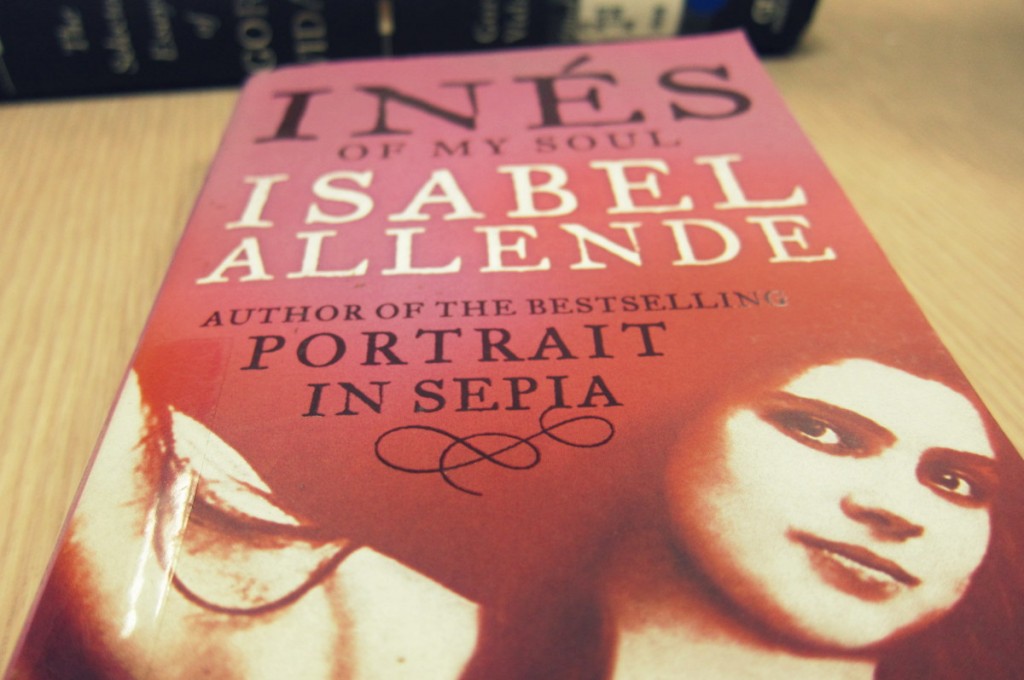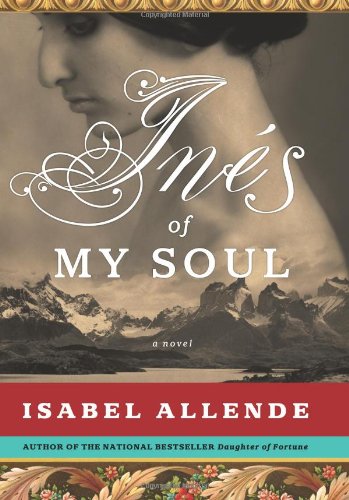 In the early years of the conquest of the Americas, Inés Suárez, a seamstress condemned to a life of toil, flees Spain in the early 1500’s to seek adventure in the New World. As Inés makes her way to Chile via Peru, she begins a fiery romance with Pedro de Valdivia, war hero and field marshal to the famed Francisco Pizarro.
In the early years of the conquest of the Americas, Inés Suárez, a seamstress condemned to a life of toil, flees Spain in the early 1500’s to seek adventure in the New World. As Inés makes her way to Chile via Peru, she begins a fiery romance with Pedro de Valdivia, war hero and field marshal to the famed Francisco Pizarro.
It’s the work of one of my favorite female authors, Isabel Allende and while the novel — Ines of My Soul — is now several years old, like all of her other novels, it is timeless.
As I meandered through her descriptive words that takes you back to a primitive life we can’t begin to imagine, I visualized what her gallant lovers must have looked like, been like….she has three Spanish lovers in her lifetime, all of them different, all of them winning her heart in different ways.
Together, over the course of ten years, she and Valdivia, her lover through her most formative years, put a stake down in Chile and built the city of Santiago, waging war against the indigenous Chileans—a bloody struggle that change Inés and Valdivia forever.
She faces some of the same issues we do today in moments of power – jealousy, rage, greed and over time, standing her ground, she gains her own recognition as a woman, even if quietly so since it was unheard of to praise or give credit to a woman in that time.
The story demonstrates how women behind the throne are so often driving the throne….as much in the 1500’s as in the 1800’s and today.
Inés of My Soul draws you into a world where there’s passion, lust and conquest, but also horrific behavior on the part of both the Spaniards and the Indians….recounting the numerous atrocities that war creates. Beheading. Chopping off arms and legs and tossing them down the river to set an example. Gouging eyes out. All of it something that the women of the time learned to live with and in the process, mend their men along the way back to health with dignity, courage and strength.
Allende uses amusing anecdotes and references to men throughout, whether it’s her own personal intention to make a point of woman’s terrible position of the time, or not. It sings on the pages.
She writes, “the soldiers took as many Indian women as they wanted, some by force and others who were willing, but surely they must have missed words of love whispered in Spanish. Men want what they don’t have.” In Ines words, “I was the only Spanish woman on the expedition, the captain general’s concubine, visible, present, untouchable and therefore desired.” 
There’s religious references throughout and how the Indian culture conflicted with the regimented structured ‘order’ of the Catholic Church, imposing ‘itself’ on Chilean natives from Spain, a far away foreign land they could never understand. Ines had a spiritual sense about her and in that spiritual sense and constant resolve, you fell in love with her character again and again. Later, as she writes the account of her life for her daughter Isabel, she amusingly says to her, “you are like your father, practical and reasonable, and that is why you cannot see all the people wandering through my rooms without permission.”
I had to smile since I thought of lovers in my own life who were the same practical and reasonable types as her third and final lover, Rodrigo, who she married at age 40, still childless, a man who would never understand the intuition a woman inherently has around her, beneath her, beside her, inside her…
She also proceeds to give her daughter advice about love in her dying moments, telling her that most Spanish men, at least the captains she knew intimately, knew nothing of love. It was her, Ines, who had to teach them. “They are ill informed in regard to lovemaking,” she tells Isabel and goes on to say that if she has any complaints with her husband, to talk to her since after she’s dead, she won’t have anyone to go to for that kind of advice.
And this is a real kicker, “Men, like dogs and horses, have to be domesticated, but there are not many women capable of doing it, since they themselves know nothing unless they have a teacher….besides women are saddled with inhibitions.” Two pages later she writes, “Courage is a virtue appreciated in a male, but considered defect in our gender. Bold women are a threat to a world that is badly out of balance, in favor of men. That is why they work so hard to mistreat us and destroy us. But remember that bold women are like cockroaches: step on one and others come running from the corners.”
We’ve come so far and yet…..if my grandmother were still alive, she would likely agree that today, in 2013, men would still need to be domesticated and she was a master at it, her lady friends would tell me in my early twenties. Women used to seek out her advice for how to domesticate their husbands in the 1930’s and I thought, “there’s always someone like my grandmother, like Ines,” that women have turned to over the centuries and still do today. Some things never change.
I loved the book as I’ve loved every other Isabel Allende book and hope one day to meet her, even have lunch and a toast to all she’s accomplished and how much she has inspired other women and writers around the world. Her authentic and passionate resolve shows up again and again in all her characters, particularly the women, whether it’s the 1500’s, the 1700’s or the turn of the century.

Renee Blodgett is the founder of We Blog the World. The site combines the magic of an online culture and travel magazine with a global blog network and has contributors from every continent in the world. Having lived in 10 countries and explored nearly 80, she is an avid traveler, and a lover, observer and participant in cultural diversity.
She is also the CEO and founder of Magic Sauce Media, a new media services consultancy focused on viral marketing, social media, branding, events and PR. For over 20 years, she has helped companies from 12 countries get traction in the market. Known for her global and organic approach to product and corporate launches, Renee practices what she pitches and as an active user of social media, she helps clients navigate digital waters from around the world. Renee has been blogging for over 16 years and regularly writes on her personal blog Down the Avenue, Huffington Post, BlogHer, We Blog the World and other sites. She was ranked #12 Social Media Influencer by Forbes Magazine and is listed as a new media influencer and game changer on various sites and books on the new media revolution. In 2013, she was listed as the 6th most influential woman in social media by Forbes Magazine on a Top 20 List.
Her passion for art, storytelling and photography led to the launch of Magic Sauce Photography, which is a visual extension of her writing, the result of which has led to producing six photo books: Galapagos Islands, London, South Africa, Rome, Urbanization and Ecuador.
Renee is also the co-founder of Traveling Geeks, an initiative that brings entrepreneurs, thought leaders, bloggers, creators, curators and influencers to other countries to share and learn from peers, governments, corporations, and the general public in order to educate, share, evaluate, and promote innovative technologies.








